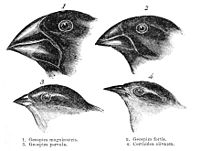
Photo from wikipedia
Derek Frank Bruce Roberts was born in London, UK on 20 July 1925. He served in the Lincolnshire Regiment of the British Army from 1943 to 1946 during WW II,… Click to show full abstract
Derek Frank Bruce Roberts was born in London, UK on 20 July 1925. He served in the Lincolnshire Regiment of the British Army from 1943 to 1946 during WW II, and after this army service, in 1948, he received a BA degree in Geography and a later MA from the University of Cambridge. While at Cambridge he developed an interest in the biology of human variation and was awarded a Diploma with Distinction in Physical Anthropology. From 1949 to 1963 he worked as University Demonstrator in the Department of Anatomy, University of Oxford with Wilfrid E. Le Gros Clark while undertaking anthropological field surveys in Sudan and forming an informal group of Oxford-based workers interested in genetics. His earliest field research was in the southern Sudan with Nilotic peoples in 1953–1954, where he conducted studies of physique, child growth, demography, climate, and genetics. This field research was identified as very difficult and challenging, but research about which he was most proud (Harper, 2003). During that period he published several classic articles on climate and human variation and on demography (Roberts, 1952, 1953, 1956). Much of his research on human biogeography and climate was compiled in a short book published several years later (Roberts, 1978). In 1960, he spent a year with James V. Neel at Ann Arbor, Michigan with a Fulbright Fellowship before moving to the University of Washington, Seattle where he remained for a year as Visiting Professor. In 1963, he returned to Oxford University to join Alan Stevenson’s Medical Research Council (MRC) unit, and in 1965 was appointed to develop Human Genetics at Newcastle University. Among other activities there, he continued with population studies, notably of the evacuated Tristan da Cunha population (Roberts, 1971), while laying the foundations for medical genetics, including developing a cytogenetics laboratory and clinical genetics services. In addition to the Tristan da Cunha research, he conducted numerous small-population genetics studies in Newcastle, Croatia, and the Shetland and Orkney Islands (Roberts, Papiha, & Poskanzer, 1979, Roberts & Roberts, 1983). Other genetics research which Derek led included the genetics of diseases such as Down syndrome, multiple sclerosis, muscular dystrophy, retinoblastoma, and albinism. He remained at Newcastle University until his retirement in 1990. Derek has been credited with the use of the term “anthropological genetics” referring to research on small populations in the context of human variation and evolution (Crawford, in press). Derek’s service to the profession of Biological Anthropology has been substantial. For example, he was one of the founding fathers of the Society for the Study of Human Biology in the UK (Roberts & Weiner, 1958) and was instrumental in setting up the European Anthropological Association. He was an honorary member of the Society for the Study of Human Biology and the Biosocial Society. He edited the Journal of Biosocial Science for over 10 years, was an active Trustee of the Parkes Foundation from its inception for nearly 30 years, and was Secretary-General of the International Association of Human Biologists for 12 years. He was also a founding editor of the highly successful Cambridge University Cambridge Studies in Biological and Evolutionary Anthropology. He was an active member and an office holder in many international organizations and programs such as the International Biological Programme (IBP), the FIGURE 1 Derek F. Roberts in 1974 at theWenner-Gren Foundation Symposium #63 “The role of natural selection in human evolution.” (Photograph with the permission of theWenner-Gren Foundation for Anthropological Research, Inc.)
Journal Title: American Journal of Human Biology
Year Published: 2017
Link to full text (if available)
Share on Social Media: Sign Up to like & get
recommendations!